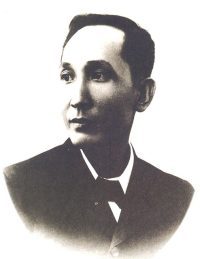This month predicts a sad future for the prisoners in the prison house.
Ever since we arrived in the island, we have been fed with canned goods and it was very seldom that we were given fresh meat during the time of Commander Orwig. We had canned meat, canned salmon and bacon, potatoes, etc. Although in the last few days we were already satiated, we did not mind it too much since we were still able to buy from the Commissary sardines, shrimps in cans, ham and other things.
During the time of Captain Shaw, who manifested great concern for us, we were served salmon and given a supply of fresh meat twice a week. Besides, during this time, we could ask either though the guy with a shaven head or through our cook who also had a shaven head to buy for us vegetables, chicken and other goods.
Shaw finally left and Captain McKelvy assumed command. This time, we no longer had potatoes but beans; we could not buy from the Commissary other than cigarettes and they stopped giving us fresh meat. Besides, our head-shaven cook had left and was replaced by Agramon, another companion of ours, who was paid a salary of 30 pesos; however, we were still able to ask the milkman and the servants of those who transferred to Agaña, and who came to visit us often, to do this favor for us, since they were allowed to ride in a car-ambulance that plies through Agaña and Piti (round trip) three times a day.
Then the prisoners ran out of money and the milkman stopped coming, because only a few were able to buy milk. Later, our companions’ servants in Agaña were prohibited from riding in the ambulance, which was solely intended for the Americans and the government service. First we appealed to Captain McKelvy and then to Mr. Pressey, Judge of the Court of First Instance and Assistant to the Governor, that we be supplied fresh meat, as it used to be during the time of Captain Shaw. They promised to do so, but this was never fulfilled.
Lastly, at the start of this month, the prisoners could no longer eat canned meat, no matter how they forced themselves, because they felt nauseated and wanted to vomit. I found out later that the cook, in agreement with the prisoners, did not want to get the ration of canned meat from the Commissary, which supply was to last for ten days. Thinking Captain McKelvy would be offended, I talked to Mr. Llanero, who, being the President, represented the prisoners, so that he could write the captain telling him that the canned goods have not been claimed and that he was advising him about this so that the goods would not be wasted, since the prisoners would not take them.
Captain McKelvy got mad, saying that the prisoners have no right to refuse what is given them; nevertheless, he gave us a supply of fresh meat for a period of three weeks. Then, the cook was ordered to receive the usual supply of canned meat, and we were forbidden to ask the head-shaven guys to buy for us anything, since the Commissary takes care of buying what we need. Our companions ordered the purchase of twenty pounds of meat. It cost them a lot of money but the meat already smelled rotten when delivered to them. On the other hand, those who wish to live in Agaña were not granted a permit. We spent Christmas of 1901 with these painful thoughts. This is not surprising to me, because we were brought here precisely to make us suffer. Much as I am willing to suffer everything, I’m afraid my sick and weak body cannot withstand a prolonged self-deprivation. Be that as it may, I am convinced I will die all by myself, when my country shall no longer need my services.
Mr. Pressey invited me twice to live in Agaña, saying I must not worry about the money, since I would have enough. I have refused these offers, thinking it improper to leave our companions during these critical times.
Besides, I must add that in the past few days, when our companions had just transferred to Agaña, several times the community received from them gifts in kind, such as meat, fish and other things. I remember Mr. Dimayuga in particular, who has often sent me meat and vegetables, etc.
Lastly, I remember Captains Shaw and McKelvy, who took the trouble of teaching us (me and some companions) English, whenever their work allowed them to. Some weeks ago, I had given up studying the language, on account of my poor nourishment, which has deprived me of my high spirits, thinking it would be futile to continue, if, in the end I should die here or return to the Philippines, very sick and incapable of doing something good.
Goodbye to you, 1901! You are leaving us with a sad memory, yet a painful mark in my heart. I welcome you, 1902! Let this year be less severe, not with me anymore, but with my companions and friends.
